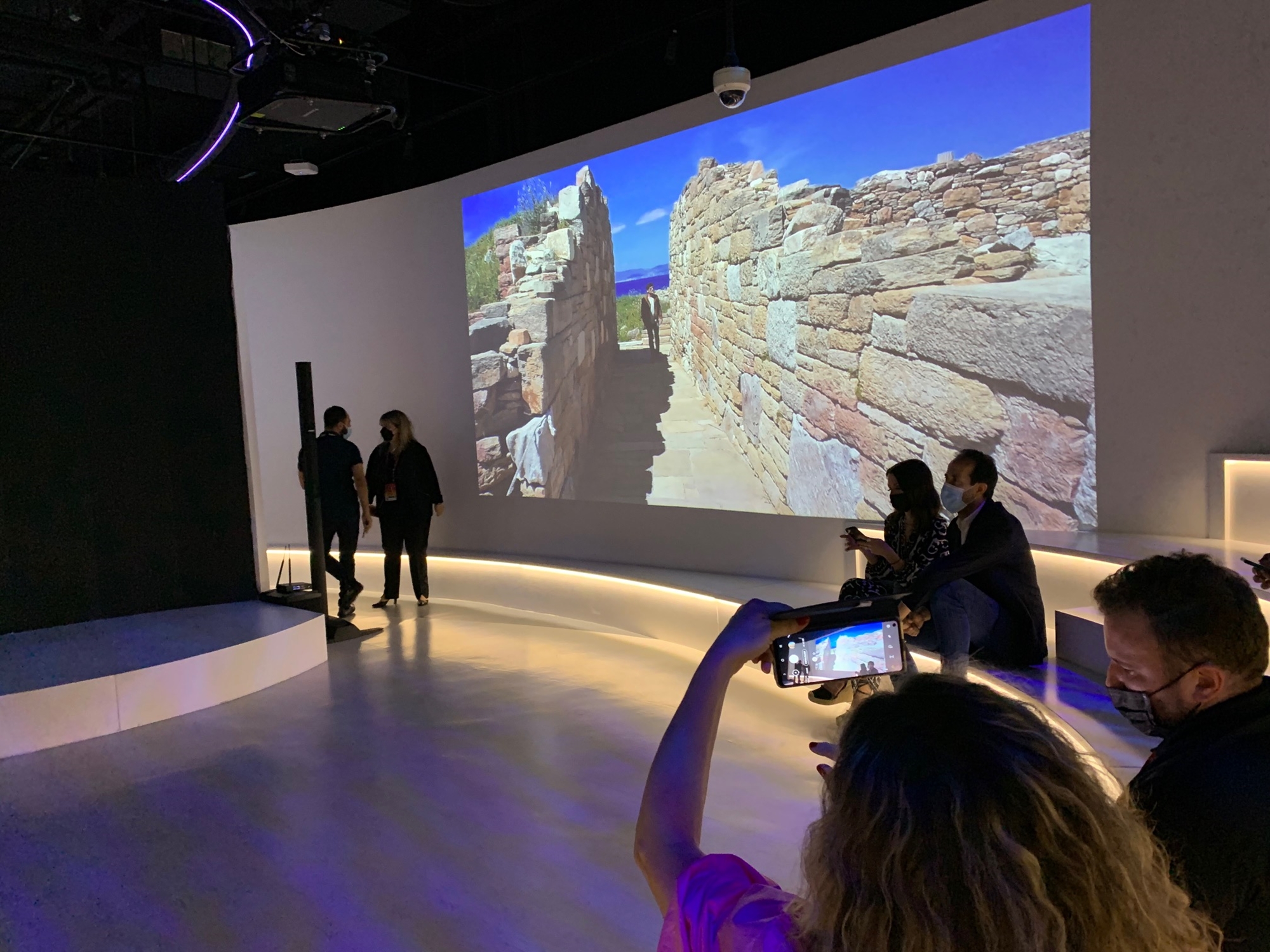The Delian light shines at Expo 2020 in Dubai
Greek Pavilion showcases country’s most outward-looking, creative and dynamic profile at massive international event in UAE’s biggest city

A woman wearing a traditional abaya is watching the video intently. She snaps pictures with her cellphone at the moment where the Lions of Delos, gleaming in the Cyclades sun, appear on the screen.
We were at the Greek Pavilion at Expo 2020 in Dubai just before it wrapped up at the end of March, having started in October last year. The Expo is a global “bazaar” which takes place every five years at a different location – the next one is to take place in Japan. Expo 2020’s motto was “Connecting Minds, Creating the Future,” and it truly was a vast array of cutting-edge technology, amazing design and avant-garde architecture.
Delos and Dubai share similarities as important economic and commercial hubs in their respective eras
The emirate invested a lot in Expo 2020 in order to achieve a much-desired economic leap. After Covid-19 forced a postponement to its planned October 20, 2020 start – it kept the name Expo 2020 for branding and marketing purposes – the massive event attracted more than 15 million visitors from around the world. Indeed, the whole world took part: 192 countries participated with their own pavilions and some of them were spectacular, indeed. The United Arab Emirates Pavilion, for example, where we saw long waiting lines throughout the day, is an architectural masterpiece courtesy of Santiago Calatrava. The Spanish master was inspired by the Emirates’ national symbol, the hawk, to create a building that opens and closes its “wings” via a special device. This pavilion, like a few others, will remain, while some will be repurposed as part of a planned new business district and the rest will be demolished.
A large part of the Expo was dedicated to sustainability. Its centerpiece was the Sustainability Pavilion, designed by London-based Grimshaw Architects after the drought-tolerant Socotra dragon tree, which can live even in the harshest desert environments and, in the Emirates, symbolizes resilience and durability. Self-sufficient in electricity and water and made using 97% recycled steel, the pavilion comprises shade-providing “energy trees” and “water trees,” where solar panels harness energy to power the structures’ facilities and rainwater is collected. It is now set to become Terra, a holistic science center.
The Greek Pavilion was part of the Sustainability District. By the time we visited, it had welcomed some 360,000 visitors, who were informed about Greece’s strategic advantages in eight sectors: agribusiness, cultural tourism, environmentally friendly energy, health sciences, industry shipping, technology and workforce training. In other words, the visitors got to know the country’s most outward-looking, creative and dynamic profile.
A documentary about the now uninhabited, monumental island of Delos was shown at the pavilion. The Greek organizers wanted to use the Delian light as a metaphor illuminating the symbolic connections between the future and the past and Greece’s modern identity at the crossroads of science and art.
To that effect, the Ministry of Foreign Affairs, the Municipality of Mykonos and state investment and trade company Enterprise Greece organized an event in February titled “A Universal Narrative of Light: From Apollo’s Delos to a Brighter Future” hosted by Deputy Foreign Affairs Minister for Diaspora Greeks Andreas Katsaniotis. Speakers included Omar Saif Ghobash, the United Arab Emirates’ assistant minister for culture and public diplomacy; Peter Frankopan, professor of global history at Oxford University – where he is Stavros Niarchos Foundation Director of the Oxford Centre for Byzantine Research – who spoke on Delos’ uniqueness as a placeholder of Western civilization; Shireen Atassi, director of the Atassi Foundation for Arts and Culture, which aims, among other things, to preserve and promote modern and contemporary art and archives from Syria; Tunisian architect Ali Bouziri; Emirati poet, artist and filmmaker Nujoom Alghanem; and artist Efi Spirou, whose work, “Metamorphoses,” an installation inspired by a long study of light, was exhibited at the Greek Pavilion.
Eleftheria Deko, a Greek lighting designer, emphasized the value of light by analyzing her own work in redesigning the lighting of the Acropolis in Athens, a redesign, she said, aimed at enhancing the monument’s “voice.” Yannis Ioannidis, professor at Athens University’s Department of Informatics and Telecommunications, highlighted the value of digital storytelling in the dynamic and constantly changing relationship between a monument and its visitors. Alexandra Mitsotaki, president of think tank World Human Forum, spoke of the danger to Delos’ existence if the climate crisis is not tackled, while Mykonos Mayor Konstantinos Koukas spoke of the added value that Delos, as a global ancient destination, provides to Mykonos, a contemporary global destination. Koukas said his municipality plans to host an annual forum on sustainable tourism and local identities.
Dimitris Athanasoulis, head of the Greek Archaeological Service’s Cyclades branch, emphasized the similarities between Delos and Dubai as important economic and commercial hubs in their respective eras, with favorable tax regimes as tax- and duty-free ports, as multicultural places of religious diversity and as societies that flourished in an unfriendly natural environment.






